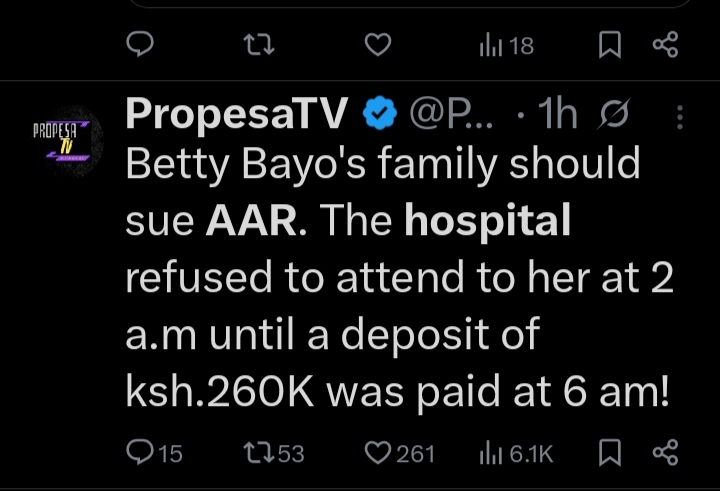AAR Hospital has once again found itself at the center of public outrage following the heartbreaking death of gospel singer Betty Bayo. The tragedy has sparked nationwide anger and reopened a painful discussion about how private hospitals in Kenya handle emergencies.
Betty’s death has not only shocked her fans but also exposed the brutal reality many Kenyans face when medical care is delayed over payment demands.
According to witnesses, Betty fell critically ill late at night and was rushed to AAR Hospital along Kiambu Road at around 2 a.m. Her family arrived terrified and desperate for help, hoping that doctors would act immediately.
Reports indicate that she had a suspected burst vein in her head, a condition that needed instant medical attention. But instead of being attended to, her family was told to first pay a massive cash deposit before doctors could proceed.
The staff allegedly demanded about 260,000 shillings upfront, a process that dragged on for hours as her condition worsened. By the time the payment was finally made close to dawn, Betty’s health had deteriorated beyond saving.

It later emerged that Betty had been battling leukemia, a serious blood disorder that weakens the immune system.
Friends such as gospel artist Ben Githae confirmed that after the long delay at AAR, she was eventually transferred to Kenyatta National Hospital, where she died on Monday morning. Her death has caused a storm online, with activists and netizens accusing AAR Hospital of valuing money over human life.
Francis Gaitho, a popular commentator, went as far as labeling private hospitals “predatory” and “extortionist,” calling for serious government intervention in the health sector.
Many Kenyans are questioning why AAR Hospital insisted on a huge deposit even when Betty was in critical condition and reportedly covered under the Social Health Authority (SHA). The move has been described as unethical and inhumane by many. Social media users argued that such behavior has become common in private hospitals, which often refuse to treat patients until payments are confirmed. Some even accused AAR of favoring rich and influential clients while ordinary Kenyans suffer or die waiting for clearance.

The outrage reflects growing frustration over the commercialization of healthcare in the country.While a few people defended the hospital, claiming policies differ depending on the situation, they still admitted that there is no clear emergency protocol in place.
One former patient recounted how he was treated before being asked for payment later, raising concerns about why such fairness isn’t applied consistently.
The confusion and selective treatment show the lack of transparency in how hospitals decide which patients deserve immediate attention.
Betty’s death has reignited anger over Kenya’s fragile healthcare system, where private hospitals appear to thrive on desperation. Public hospitals, on the other hand, remain overcrowded and poorly equipped, forcing citizens to seek help in private facilities that treat medical care like a business transaction.
Many now believe that Kenya’s medical system needs urgent reform to prevent similar tragedies.Her death has become a painful reminder that life-saving care should never depend on one’s bank balance. If AAR Hospital had acted faster, perhaps she could have survived. Her story has left Kenyans demanding accountability, not only from AAR but from the entire health system that continues to fail its people.





















Add Comment